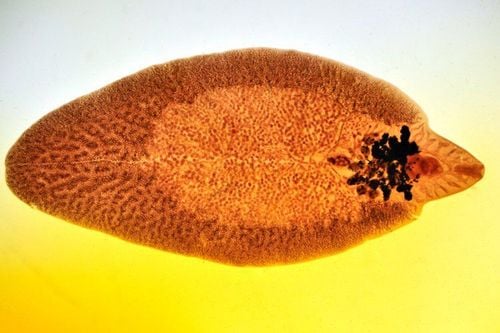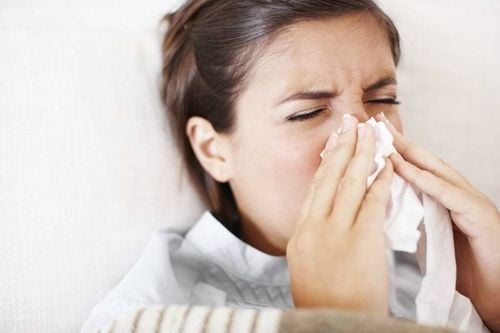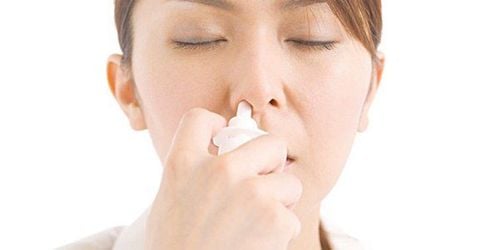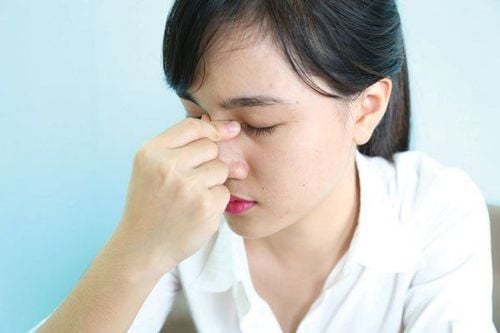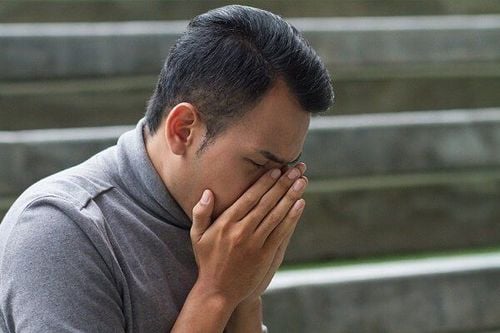This is an automatically translated article.
The article was professionally consulted by Specialist Doctor of Otolaryngology - Department of Medical Examination and Internal Medicine - Vinmec Hai Phong International Hospital.
Sneezing is a familiar response of the body to different stimuli. But not everyone knows that sneezing is an immune system response and is often meant to protect the body.
1. Why does sneezing happen?
The human nose holds the important job of filtering, humidifying, and warming the air before it enters the lungs. The nose also secretes mucus to clear bacteria and foreign objects out of the airways.
However, not everything is prevented, there are still small objects from the outside environment that penetrate, causing irritation of the mucous membranes in the nose and in the throat. At that time, the irritated mucous membrane will send a signal to the brain, the brain will immediately activate the sneeze reflex to remove the foreign agent from the nasal cavity.
The sneeze process only happens for a few seconds. During a sneeze, we often close our eyes, the roof of the mouth is soft, the uvula will press down, the back of the tongue is raised to block the ventilation from the lungs to the mouth, making the air to be pushed out through the nose. Sneezing can bring along small droplets of water, mucus, and bacteria and viruses, if any.
2. Common causes of sneezing
2.1. Allergies The human immune system is responsible for protecting the body against harmful agents. When an allergy occurs, the body's immune system sees the invading object or organism as a threat and tries to get rid of them by sneezing.
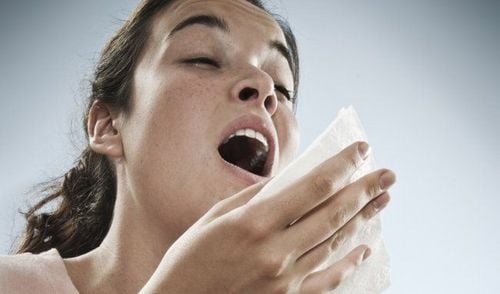
2.2. Infections Viral infections of the common cold and the common cold can also make you sneeze. According to experts, there are more than 200 viruses that can cause colds in humans, but the most common is still the Rhino virus.
2.3. Some other causes Injuries to the nose Suffering from sore throats, rhinitis, flu Stop taking certain medications such as opioid pain relievers Inhaling irritants, most visible including dust and pepper, the smell of onions, perfumes, pollen, dyes in fabrics... Inhale sudden cold air. Sunlight can be the cause of sneezing syndrome, and this syndrome can be passed on from parents to children. The patient may sneeze one by one or sneeze in series which is very uncomfortable. Sometimes just a slight change in the weather causes a patient to sneeze continuously. After a sneeze may return to its normal state completely or the sneezing may continue.
3. Does sneeze signal disease?
Sneezing can affect a person's quality of life, especially in occupations that require frequent face-to-face communication. Due to the increasingly hot climate change, modern life has to work mainly in the office - where the glass rooms use air conditioning continuously, increasing the number of people who sneeze significantly.

Sneezing often occurs in the morning, when waking up or when entering an air-conditioned room from outside, this is not a sneeze caused by a disease but simply a response of the body.
On the other hand, based on the appearance of the sneezing attack and its accompanying symptoms (runny and stuffy nose, headache), doctors can relatively classify the cause as to sudden irritation. or from diseases related to vasomotor rhinitis or allergic rhinitis - diseases of a familial nature.
When examining, the nasal mucosa is edematous, pale or purple in color, these may be polyps formed by the degeneration of the nasal mucosa during long-term inflammation. In some patients, sneezing occurs during certain seasons of the year, so it's important to find the right cause for effective treatment.
4. Effective remedy for sneezing
The simple way to fix it is to find the cause, treat it with medication and make some simple home changes to reduce the irritation. You need to clean your house, keep your bedroom clean, keep your body warm when the weather changes, avoid showering in the early morning... Change the air filter to ensure fresh air. If you have pets, you need to regularly shave or keep pets in the house. Regularly vacuum on the sheets, blankets, pillows... Before entering the air-conditioned room, you should take a deep breath, then exhale slowly when entering the room to make the air warmer when taking a breath. two. If sneezing persists and is accompanied by symptoms such as a stuffy nose, fever or other abnormalities, you need to go to a medical facility for examination and treatment. Certain prescription and over-the-counter antihistamines (loratadine and cetirizine) can help improve symptoms quickly.
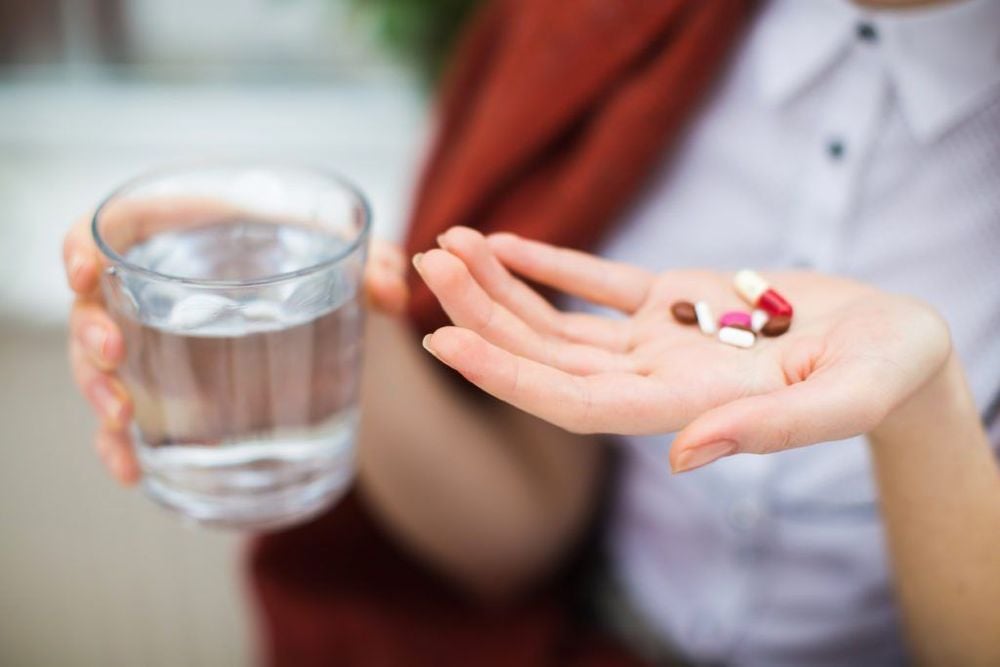
If sneezing is a symptom of an infection, it is necessary to coordinate with a doctor to find a treatment. Antibiotics cannot treat viruses that cause colds and flu. Usually, if you have the flu, you can use a nasal spray to relieve a stuffy or runny nose. Antiviral medications are used to speed up recovery from the flu. Patients need to rest and drink lots of water to help the body recover faster. If not treated promptly, it will cause complications such as pharyngitis, laryngitis - bronchiolitis, making the time to take the drug prolonged, the patient's recovery time is long. Nasal polyps...
5. Some frequently asked questions about sneezing
5.1. Why do pepper and some spices cause sneezing? Pepper and some spices contain piperine, which can cause irritation if it enters the nose. So when you grind fresh pepper or pour it into a jar, they can cause sneezing.
5.2. Why do you close your eyes when you sneeze? Currently, experts still do not understand why we have to close our eyes when sneezing. However, according to some reviews, automatic eye closing is the body's way of preventing foreign objects from being "expelled" out of the respiratory tract from entering the eyes.
5.3. Sneezing when looking at the sun According to a study by the National Institutes of Health, up to one-third of the population sneezes when looking directly at the sun. This phenomenon is known as the “Optical Sneeze Reflex” or “Achoo Syndrome”.
This phenomenon is related to the trigeminal nerve, when light shines directly into the eye, this will stimulate the optic nerve, which will send signals to the brain, the brain processes the signal and then gives commands. pupils narrow. However, instead of sending the signal from the brain to the eyes, it was mistakenly transmitted to the nose, forming a sneeze reflex.

5.4. Do you sneeze while sleeping? Sleep has a special mechanism that can prevent us from sneezing while sleeping. According to experts, when we sleep, it is because we are less exposed to foreign objects that cause nasal irritation such as animal hair, sunlight ... which limits stimulation to the nose.
Besides, the two stages of sleep, REM (rapid eye movement) and non-REM (barely moving eyes) have special mechanisms to prevent sneezing.
Sneezing is a familiar response of the body to different stimuli. However, if the sneezing situation persists without finding the cause, you should go to the medical center to examine and find the right treatment.
Vinmec International General Hospital is the address for examination, treatment and prevention of diseases. When performing the examination process at Vinmec, customers will be welcomed and used the standard facilities, modern machinery system along with perfect medical services under the guidance and advice. of well-trained, well-trained doctors both at home and abroad.
Customers can directly go to Vinmec Health system nationwide to visit or contact the hotline for support.




